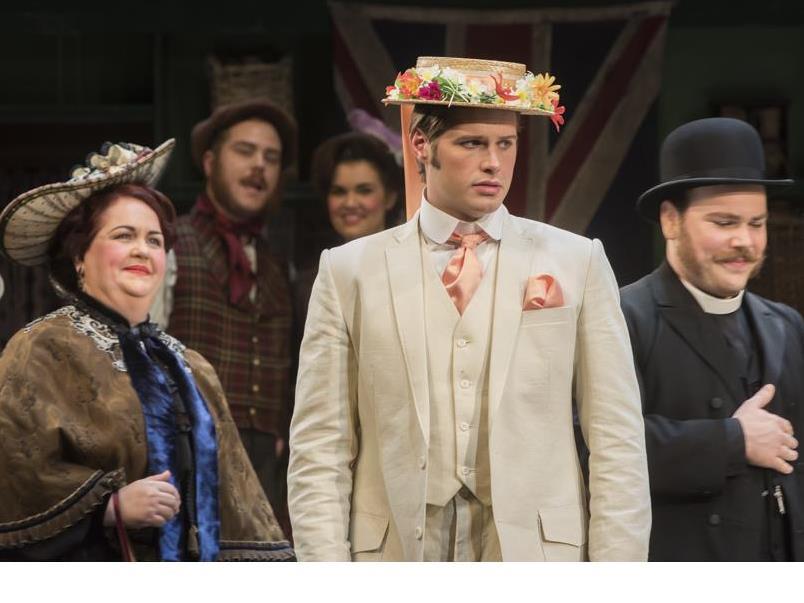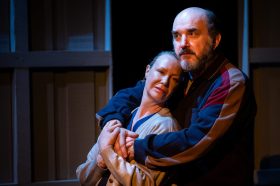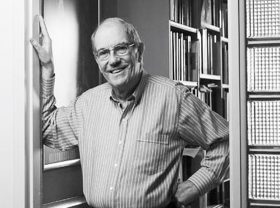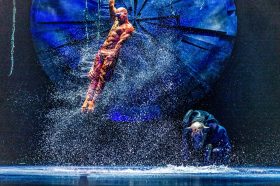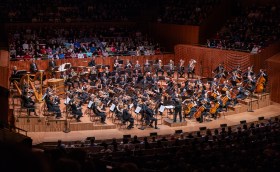From L – R: Dominique Fegan, Oliver Boyd, Tegan Holland, Sebastian Maclaine and Joshua White in Albert Herring. Photograph by Michael Cranfield supplied courtesy of QCGU.
Its subject matter is light-hearted but, at its core, Albert Herring – set in a fictitious, claustrophobic village in Britten’s own Suffolk at the beginning of the twentieth century – raises serious questions about the British class system and Victorian morality. This theme was close to his heart.
The Queensland Conservatorium of Music, Griffith University (QCGU) decided to tackle this piece at an impressive and dynamic level, setting the bar high by raising opera standards well above an average student production. Conductor Nicholas Cleobury, also Head of Opera at QCGU, was masterful and purposeful in his clear and deliberate musical direction of the work. He managed to produce an astonishingly rich sound from his small 13 piece ensemble, consisting of only single strings and wind, with the addition of piano, harp and percussion. Both woodwind and strings played beautifully with a maturity in the sonority of Britten’s complex music producing excellent intonation. Cleobury paid close attention to his singers, assisting them technically while making sense of the verbose libretto through excellent diction. One wondered if we really needed surtitles at all, so clear was the sung phrasing of these young singers. The ensembles seemed particularly well rehearsed and delivered, as were the orchestral interludes.
With a full-blown production offering not one, but three separate settings, the curtain rose on Lady Billows’ manor house in an opening scene that was as lavish as any West-End stage production, no expense spared. An overblown and huge Joshua Reynolds painting was amusingly utilised to show photos of the possible May Queens before Albert Herring is chosen as May King. It was a neat trick though somewhat anachronistic in terms of the period. The Grocer’s shop in Act 2 alongside the Act 3 village street scene were equally detailed and charmingly designed. Production designer, Felicity Abbott, also provided wonderful visual images of the period projected on the front curtain linking the various scenes accompanying the musical interludes. Period costuming of a high standard was designed by Wendy Cork, with exquisite lighting from Nigel Levings, loaning professionalism to the production.
Directed by celebrated film director, Bruce Beresford, himself a self-confessed fan of Britten’s operas, the production was inherently filmic, full of minute business and attention to detail. Beresford, ably assisted by Cath Dadd, produced some excellent stage pictures with cameo roles subtly fleshed out and an emphasis on stillness rather than frenetic activity, which worked well for a work that is both verbally and musically intense. His direction was both understated yet commanding.
There are two complete casts over five performances. On opening night, the glorious local dignitary group comprised charming lyric soprano, Kathryn O’Halloran, as Miss Wordsworth with baritone Joshua White as the vicar and bass Joshua Ruben’s police superintendent, alongside the indefatigable ringing tones of tenor Iain Henderson as the Mayor. Dominique Fegan, a former alumni of the QCM, gave a swaggering authority to the pompous Lady Billows, feared by all, with Melissa Gregory a crafty yet subservient Florence.
Two of the stars of the evening were Oliver Boyd, his mellifluous baritone making a fine larrikin of Syd, and the creamy sound of Tegan Holland’s soprano as the vivacious Nancy. Their duets were well crafted. Shikara Ringdahl as Albert’s mother had an engaging soprano, while the three young children were delightful.
In the title role, Sebastian Maclaine had the hardest job in portraying Albert’s complex character, though he made an impressive attempt. Looking perfect in the part, his is a pleasant tenor that musically managed the requirements of the role and the many arias. He had some difficulty depicting both drunkenness and the ultimate change in Albert’s behaviour, though his new-found confidence was assured at the end. It is a tough call for any young singer and overall he succeeded.
On nearly every level, this Albert Herring is as close to a professional production as one can get. Together with the recent Musical Theatre production of The Secret Garden, QCGU is clearly offering high-quality musical training to young performers that should stand them in good stead for their future careers.
Star rating: 4 stars out of 5
Albert Herring
Composer Benjamin Britten
Director Bruce Beresford
Conductor Nicholas Cleobury
Production Designer Felicity Abbott
Costume Designer Wendy Cork
Lighting Designer Nigel Levings
Assistant Director Cath Dadd
Griffith University Queensland Conservatorium and Brisbane Festival
Conservatorium Theatre, Griffith University, Southbank until 17 September 2016
